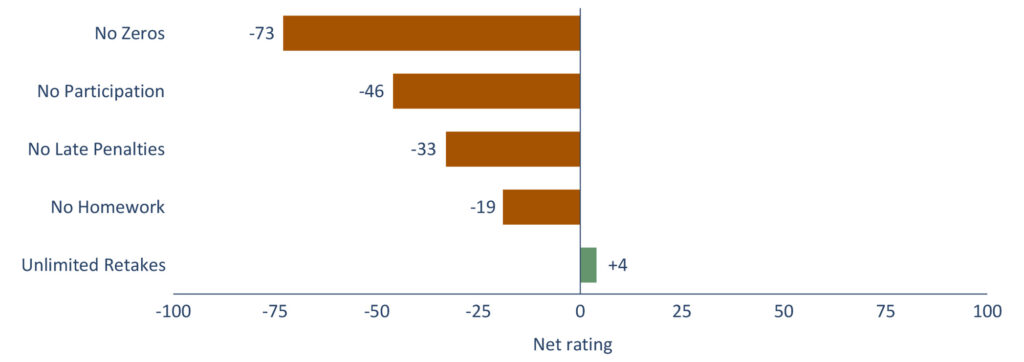
New Jersey Gets a ‘D’ in Parent Power, Says New Report
August 19, 2025
Freehold Teacher Wins Fulbright Award
September 2, 2025Teachers Say Policies Like 64 Floor Are Bad For Students
In 2019, New Jersey Education Commissioner Lamont Repollet, former superintendent of Asbury Park Public Schools, told the Senate Budget and Appropriations Committee that he instituted a scheme called the “64 Floor” that barred teachers from giving failing grades to students, regardless of their performance in class, to advance “equity.” By artificially boosting final class grades, he told committee chair Senator Declan O’Scanlon, he was protecting Black and Hispanic students — like himself — from racist, power-hungry teachers.
“If I give Lamont a zero, how will Lamont pass my class, he would every time have to get 100, he would have to be perfect,” Repollet explained. “What message as educators are we sending to our kids if we tell them we have to be perfect? That’s not the lens through which I see education. I see education a little differently, right? So we have to make sure our grading systems are fair and equitable.”
Now a new analysis out today from the Fordham Institute, “‘Equitable Grading Through the Eyes of Teachers,” finds that these sorts of policies— no zeros, no grade below 50, eliminating late penalties, allowing unlimited retakes— simply inflate grades and erode accountability. And teachers believe they “ultimately hurt student learning.”
In New Jersey, it’s not just Asbury Park.
At South Orange Maplewood Public Schools — far richer and whiter than Asbury — leaders of Maplewood Middle School explained to school board members that students who had been receiving zeroes “were finding themselves in holes and unable to dig themselves out.” Therefore, no zeros, regardless of whether students even showed up for class. At Hackensack Public Schools (far more diverse), superintendent Thomas McBryde advanced a grading policy (which he brought with him from Norwalk) that “would allow students to retake tests and set 50 percent as a minimum grade, while emphasizing project-based learning — all in an effort to increase equity.” (McBryde was suspended in July for reasons that remain unclear.)
Fordham says these policies have now been adopted by about half of America’s public schools (more in the country’s “majority minority” middle schools). As a result they “tend to reduce expectations and accountability for students, hamstring teachers’ ability to manage their classrooms and motivate students, and confuse parents and other stakeholders who do not understand what grades have come to signify.”
In other words, these policies publicly obfuscate students’ mastery of grade-level subjects (which is how Repollet raised Asbury Park’s graduation rate to over 80% despite basement-level proficiency levels based on state standardized tests). The Commissioner — selected by Gov. Phil Murphy because of that sharp increase in graduation rates — told the Senate committee back in 2019 he would now take the 64 Floor statewide: “As the Commissioner of Education and our Department moving forward and our Governor talks about a stronger and fairer New Jersey, well the fairer piece is equity and we will continue to operate so that our students don’t have just equal and not just access but have opportunities and that’s the equity piece.” For instance, in 2023 the Murphy Administration’s Department of Education lowered expectations for a high school graduation diploma by changing proficiency cut scores.
Is lying to parents and their children about college and career readiness really equity?
In the foreword to the Fordham report, Mike Petrilli links this nationwide pretense of proficiency to “anti-racist” figures like Ibram X. Kendi and Tema Okun, calling it a “pseudo-intellectual approach [that] seeks to close whatever racial gaps it encounters by shooting the messenger,” a permutation of the soft bigotry of low expectations. According to RAND’s American Teacher Panel, teachers view this approach dimly. As part of the report, teachers were asked how they feel about various “equitable” grading practices. Here are the results:

The only policy that is supported by more than half of teachers is unlimited retakes. Here is what they they think of policies that set a minimum grade like 50 percent:
“Being given a 50 percent for doing nothing seems to enable laziness.”
“Everybody gets at least a 50 percent is insulting to the students who work.”
“We have gone to the ‘Do nothing, get a 50’ grade policy. Students have figured out that, if they work hard for a quarter (usually the first) they can ‘coast’ the rest of the year and get a D.”
“Forcing teachers to give students half-credit on assignments that have not been completed and/or turned in is a disservice to students.”
As far as 64 Floor-style masking of actual student growth and effort, teachers will take a pass.




1 Comment
And people wonder why students actually KNOW less and perform so poorly in real life!